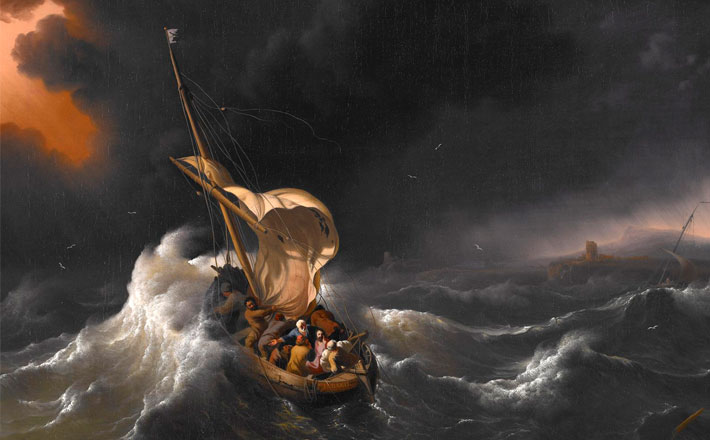Commentary on Psalm 107:1-3, 23-32
Psalm 107 is a psalm of thanksgiving, extolling God for delivering God’s people from a variety of troubles.
The lectionary text has been selected from the psalm to form a parallel to the Gospel text of the day, the account of Jesus stilling the storm (Mark 4:35-41). In fact, the selection from the psalm ends up forming a striking commentary on the Gospel text and on Jesus’ ministry as a whole.
The Shape of the Psalm
The psalm has three main parts to it:
- An introduction (vv. 1-3), which establishes the theme of thanksgiving for deliverance;
- The main body (vv. 4-32);
- A hymn constituting a conclusion (vv. 33-43).
The main body consists of four sections, each describing a situation in which God has provided deliverance:
- Being lost in the desert (vv. 4-9);
- Being prisoners (vv. 10-16);
- Being ill (vv. 17-22);
- Being in a storm at sea (vv. 23-32).
Each section is structured the same, first describing the situation of trouble, then the people’s cry for help, then the provided deliverance, and then an admonition for those delivered to provide thanks for God’s steadfast love and mighty works.
The lectionary selection includes the introduction (vv. 1-3) and the fourth scenario of deliverance, those delivered from a storm at sea.
The Introduction: God’s Character and the People’s Redemption
The introductory verses (vv. 1-3) begin with a call to praise (v. 1) and then give an admonishment to those redeemed by God to confess their redemption (vv. 2-3). Verse 1 is as basic and essential a call and statement of the human relationship to God as one can imagine: “O give thanks to the Lord, for he is good; for his steadfast love endures forever.” What the NRSV takes sixteen words to translate is a pithy seven words in Hebrew. One of these seven is khesed, which the NRSV translates as “steadfast love.” Khesed is the word expressing God’s fundamental covenant relationship to Israel; its meaning is difficult to capture adequately in English, and thus we see different English Bibles using a variety of translations in different contexts: steadfast love, lovingkindness, love, kindness, mercy, loyalty, favor, devotion, goodness, and others. The assurance in v. 1 is that this quality of God is eternal: God will never abandon Israel. The rest of the psalm elaborates on that claim.
Verse 2 builds on the call to praise with a call to confession, not of sin but of God’s redemption: “Let the redeemed of the Lord say so, those he redeemed from trouble.” The verse is striking in that, following on the very general call in v. 1, the phrase “the redeemed of the Lord” most logically refers to the entirety of God’s people rather than to some subset of it. Being redeemed by God is thus at the core of the identity of God’s people. For the ancient Israelites, this naturally hearkens back fundamentally to the experience of the exodus, and v. 3 also includes in their redemption the return from exile. For Christians, the experience of redemption from the bonds of sin may most naturally come to mind, but the references to being gathered from all directions in v. 3 ought also to remind us of how God through Christ has added all the peoples of the world to the covenant people. This is eloquently expressed in Ephesians 2, where the Gentiles are declared to be “no longer strangers and aliens,” but “citizens with the saints and also members of the household of God” (v. 19). Jesus strongly echoed the language of v. 3 of our passage when he spoke of people at the end times who will come “from east and west, from north and south, and will eat in the kingdom of God” (Luke 13:29).
Deliverance from the Storm
Psalm 107:23-30, the fourth scenario of deliverance, describes a group who gets caught in a storm while on a business trip at sea. Unlike the second and third scenarios, no fault is attributed to the group; their predicament is not said to be the result of any sin. What is surprising about the description is that the trouble is specifically said to be brought about by God, despite the lack of any cause for punishment. In fact, in the beginning of the scene (vv. 24-26a) it sounds as if the travelers are privileged to see the mighty works of God while on their voyage: “they saw the deeds of the Lord, his wondrous works in the deep” (v. 24). Their trouble seems mainly a matter of their own fear — “their courage melted away in their calamity” (v. 26b).
Nonetheless, the group cries out to God (v. 28), and God delivers — “he made the storm be still, and the waves of the sea were hushed” (v. 29). The people are then encouraged to “thank the Lord for his steadfast love” (v. 31), recalling the opening verse of the psalm (God’s khesed again). Moreover, they are also to be thankful for God’s “wonderful works to humankind” (v. 31b) — note that the Hebrew behind “wonderful works” is the exact same term as the “wondrous works” seen by the group at sea (the NRSV’s use of different translations here is rather peculiar). In other words, the group’s experience is not to be regretted, but rather even their experience of danger is to be taken as an encounter with the mighty, wonder-working God.
This Storm and Jesus’ Storm
The description of the group’s experience is remarkably parallel to that of the disciples’ experience when Jesus calms the storm, as in today’s Gospel lectionary reading, Mark 4:35-41. It is hard to imagine that Mark would not have had Psalm 107 in mind when he first recounted his story of a calmed storm, just as it is hard to imagine a Christian today reading Psalm 107 without thinking of the Gospel story. What does such a parallel suggest? Among the possibilities:
- Jesus re-enacts the Old Testament text. While it would be hard to argue that Psalm 107:23-32 should be read as a prophetic text, that Jesus so closely re-enacts this account contributes to the idea of Jesus as the embodiment and completion of Israel’s scripture.
- Jesus’ power is the power of God. The role played by God in Psalm 107:23-32 is played by Jesus in the Gospel account. Jesus’ calming of the storm should be understood as an expression of God’s own saving power. Jesus’ saving activity is an expression of the khesed of God.
- The experience of Jesus’ disciples mirrors the experiences of Israel in their own encounter with God’s mighty power. This raises the question: How do we similarly experience God’s power today?


June 21, 2015